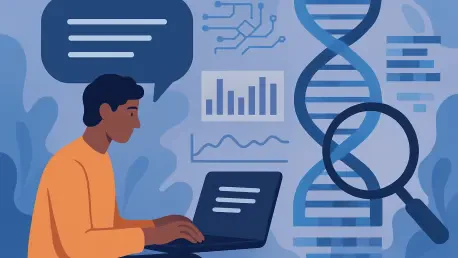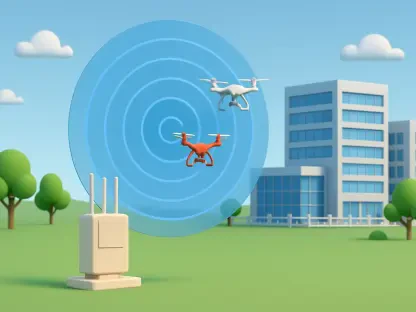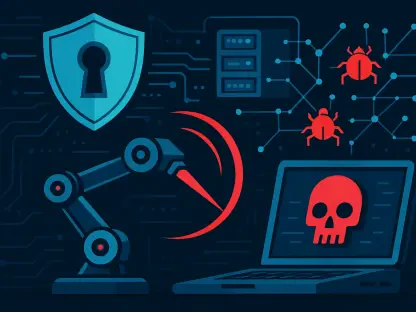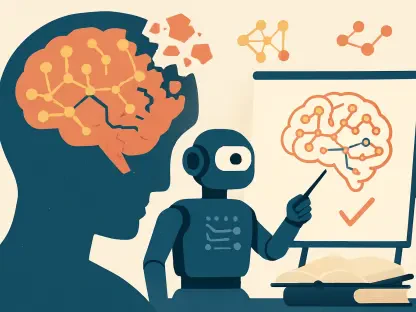In the rapidly advancing world of genomic medicine, a transformative breakthrough has captured the attention of researchers and clinicians alike: the application of natural language processing (NLP) software to interpret copy-number variants (CNVs). These structural DNA alterations, involving duplications or deletions, often underpin serious genetic disorders, making their accurate analysis vital for effective diagnosis and treatment. Historically, interpreting CNVs has been a labor-intensive endeavor, riddled with subjectivity and prone to human error due to the overwhelming volume of data geneticists must navigate. Recent research published in the Journal of Translational Medicine by Shen Chen, Cheng Liu, and Xiang Luan unveils how NLP technology can overhaul this process, delivering precision, speed, and efficiency. This development marks a pivotal shift, promising to enhance clinical decision-making and pave the way for truly personalized healthcare solutions that cater to individual genetic profiles.
This innovative software doesn’t merely aim to streamline a cumbersome task; it addresses a critical bottleneck in genomics where manual analysis struggles to keep pace with the exponential growth of sequencing data. By automating repetitive aspects of CNV interpretation, NLP tools allow clinicians to dedicate their expertise to complex, nuanced decisions rather than getting bogged down by data overload. The implications are profound, suggesting a future where diagnostic accuracy isn’t just a goal but a consistent reality across diverse medical settings. As this technology gains traction, it sparks curiosity about how far it can push the boundaries of genetic analysis and what challenges must be overcome to ensure its responsible integration into everyday practice.
Advancements in CNV Interpretation
Tackling Complexity and Error
The traditional approach to CNV analysis has long been a thorn in the side of genomic medicine, characterized by painstaking manual effort that often leads to inconsistent results. Geneticists, tasked with sifting through vast datasets, frequently encounter cognitive overload, which heightens the risk of errors and subjective interpretations. NLP software steps in as a game-changing solution, automating much of the grunt work involved in data processing. By standardizing the interpretative process, this technology significantly reduces discrepancies and allows for a more reliable output. Far from replacing human expertise, it acts as a supportive tool, freeing up clinicians to focus on strategic aspects of patient care while ensuring that the foundational analysis remains accurate and consistent across cases.
Beyond error reduction, the efficiency brought by NLP tools addresses a pressing need in clinical settings where time is often of the essence. Diagnoses that once took days or weeks can now be accelerated without sacrificing quality, thanks to algorithms that handle repetitive tasks with precision. This shift not only boosts productivity but also enhances the confidence of healthcare providers in their findings. The ripple effect is clear: quicker, more dependable interpretations translate into faster interventions for patients grappling with genetic conditions. As the volume of genomic data continues to surge, such advancements become less of a luxury and more of a necessity to maintain high standards of care in an increasingly data-driven field.
Harnessing Unstructured Data
One of the standout strengths of NLP technology lies in its ability to process unstructured data, a capability that sets it apart from conventional methods in genomic analysis. Unlike traditional tools that often struggle to integrate disparate information, this software can seamlessly analyze clinical notes, peer-reviewed literature, and extensive genomic databases. The result is a comprehensive genetic profile that captures contextual nuances often missed by manual reviews. This holistic perspective equips clinicians with richer insights, enabling more informed decisions about diagnosis and treatment plans tailored to the unique needs of each patient, ultimately fostering a deeper understanding of complex genetic conditions.
Moreover, the capacity to synthesize diverse data sources at speed positions NLP as a critical asset in managing the growing complexity of genomic information. In an era where sequencing technologies produce data at an unprecedented rate, the ability to distill relevant insights from varied inputs is invaluable. Clinicians no longer need to manually cross-reference multiple resources, as the software consolidates critical information into actionable formats. This efficiency not only saves time but also reduces the likelihood of overlooking vital details that could influence patient outcomes. As healthcare systems worldwide grapple with data overload, such tools offer a scalable solution to enhance diagnostic precision on a global scale.
Clinical Impact and Real-World Testing
Proven Performance in Healthcare Settings
The practical impact of NLP software on CNV interpretation has been rigorously tested across a variety of healthcare environments, yielding results that underscore its transformative potential. Pilot programs implemented in diverse clinical settings demonstrated a marked improvement in analysis speed, slashing the time required for interpretations compared to traditional methods. More impressively, the software achieved a high concordance rate with expert-reviewed assessments, validating its accuracy in real-world scenarios. Clinicians involved in these trials reported a noticeable boost in confidence when using the tool, as it provided consistent, data-backed insights that aligned closely with their professional judgment, ultimately enhancing the quality of care delivered to patients.
These successful outcomes translate directly into tangible benefits for those at the heart of genomic medicine: the patients themselves. Faster and more accurate diagnoses mean that individuals with genetic disorders can receive timely interventions, potentially altering the course of their conditions for the better. The software’s ability to perform reliably under varying conditions—whether in specialized research hospitals or community clinics—further highlights its versatility and scalability. This adaptability suggests that widespread adoption could bridge gaps in diagnostic capabilities across different regions, ensuring that advanced genetic analysis isn’t confined to well-resourced facilities but becomes accessible to a broader population, thereby improving health equity.
Enhancing Patient Outcomes Through Technology
Beyond speed and accuracy, the integration of NLP tools in clinical workflows has shown a profound effect on patient outcomes, a critical measure of success in healthcare. In settings where the software was deployed, healthcare providers noted an improvement in their ability to devise targeted treatment plans based on precise genetic insights. This precision is particularly vital for conditions driven by CNVs, where even small variations can dictate vastly different therapeutic approaches. Patients benefited from earlier identification of their conditions, which in turn facilitated prompt access to specialized care, reducing the burden of prolonged uncertainty and ineffective treatments that often accompany delayed diagnoses.
Additionally, the technology’s role in fostering collaboration among medical teams cannot be understated. By providing a standardized platform for interpreting complex genetic data, NLP software ensures that multidisciplinary teams—comprising geneticists, physicians, and counselors—can align their efforts based on a shared, reliable foundation. This unified approach minimizes miscommunication and enhances the continuity of care, a factor that patients often cite as crucial to their treatment experience. As these tools become more embedded in clinical practice, their capacity to not only streamline processes but also humanize care through better coordination offers a promising glimpse into the future of personalized medicine.
Ethical and Practical Considerations
Balancing Innovation with Responsibility
As NLP software reshapes the landscape of genomic analysis, it also brings to the forefront pressing ethical challenges that demand careful consideration. A primary concern is the potential for algorithmic bias, where the software might inadvertently prioritize certain data patterns or demographics over others, leading to skewed interpretations. Transparency in how these tools arrive at conclusions is equally critical, as clinicians and patients alike must trust the decision-making process. The research behind this technology emphasizes the urgency of developing robust guidelines through collaboration among technologists, ethicists, and healthcare professionals to ensure equitable use, safeguarding against unintended consequences that could undermine patient care or exacerbate existing disparities.
Accountability remains another pivotal issue when AI influences clinical outcomes, raising questions about who bears responsibility for errors or misinterpretations. Unlike human-driven processes where accountability is clearer, the integration of automated systems introduces ambiguity that must be addressed. Establishing clear protocols for oversight and continuous evaluation of the software’s performance can help mitigate these risks, ensuring that innovation doesn’t come at the cost of trust or fairness. As the adoption of such tools expands, fostering an environment of ethical vigilance will be essential to maintain public confidence in AI-driven healthcare solutions, balancing technological progress with moral imperatives.
Implementation Hurdles
Deploying NLP software in clinical settings isn’t without its logistical challenges, which must be navigated to realize its full potential. Compatibility with existing systems, such as electronic health records, poses a significant hurdle, as many healthcare facilities operate on legacy platforms that may not easily integrate with cutting-edge tools. Retrofitting or upgrading infrastructure to accommodate this technology requires substantial investment and strategic planning, often straining budgets and timelines. Without seamless integration, the efficiency gains promised by NLP could be diminished, underscoring the need for tailored solutions that align with the specific technological ecosystems of diverse medical environments.
Equally important is the training required for healthcare providers to effectively utilize these tools, a process that demands time and resources often in short supply. Resistance to change among staff, rooted in unfamiliarity or skepticism about AI, can further complicate adoption, necessitating comprehensive education programs that highlight the software’s benefits while addressing concerns. Cultivating a culture of adaptability through interdisciplinary collaboration—bringing together IT specialists, clinicians, and administrators—can ease this transition, ensuring that the shift to AI-enhanced workflows strengthens rather than disrupts established practices. Overcoming these barriers is crucial to embedding NLP technology as a cornerstone of modern genomic medicine.
Future of Genomic Medicine
Meeting the Data Deluge
The exponential growth of genomic data, driven by advancements in sequencing technologies, presents an unprecedented challenge for healthcare systems worldwide, one that NLP software is uniquely positioned to address. Manual interpretation of this data deluge is no longer sustainable, as the sheer volume outpaces human capacity, risking delays and errors in critical diagnoses. NLP emerges as an indispensable ally, transforming raw genetic information into actionable clinical insights with speed and precision. This capability aligns with the broader push toward personalized medicine, where treatments are customized to individual genetic profiles, ensuring that the benefits of genomic advancements reach patients in a meaningful, timely manner.
Furthermore, the scalability of NLP tools offers a pathway to manage future increases in data complexity, a trend expected to intensify over the coming years. By automating the interpretation of CNVs and other genetic markers, these systems can handle growing datasets without requiring proportional increases in human resources, thus optimizing operational efficiency. This adaptability is vital for healthcare systems under pressure to deliver high-quality care amid resource constraints. As genomic sequencing becomes more ubiquitous, the role of such technology in maintaining diagnostic standards will only grow, positioning it as a foundational element in the evolution of medical practice.
Broader Implications and Potential
Looking ahead, the implications of NLP technology extend far beyond CNV interpretation, hinting at a broader transformation across the field of medical genetics. Its success in handling complex genomic data suggests potential applications in other subspecialties, such as identifying rare variants or predicting disease risk with greater accuracy. This versatility could redefine diagnostic paradigms, making advanced genetic analysis more accessible even in under-resourced regions, thereby narrowing global health disparities. The prospect of democratizing such precision tools holds immense promise for creating a more inclusive healthcare landscape where cutting-edge care isn’t limited to elite institutions.
Equally compelling is the vision of a future where diagnostics achieve not only greater accuracy but also enhanced equity through technology like NLP. By addressing practical barriers—such as integration and training—and upholding ethical standards, this software could empower clinicians worldwide to deliver personalized care on an unprecedented scale. Reflecting on the strides made, it’s evident that the journey of integrating AI into genomics has already yielded remarkable outcomes. The path forward lies in building on these achievements, ensuring that technological innovation continues to harmonize with human compassion, ultimately reshaping patient care for generations to come.









